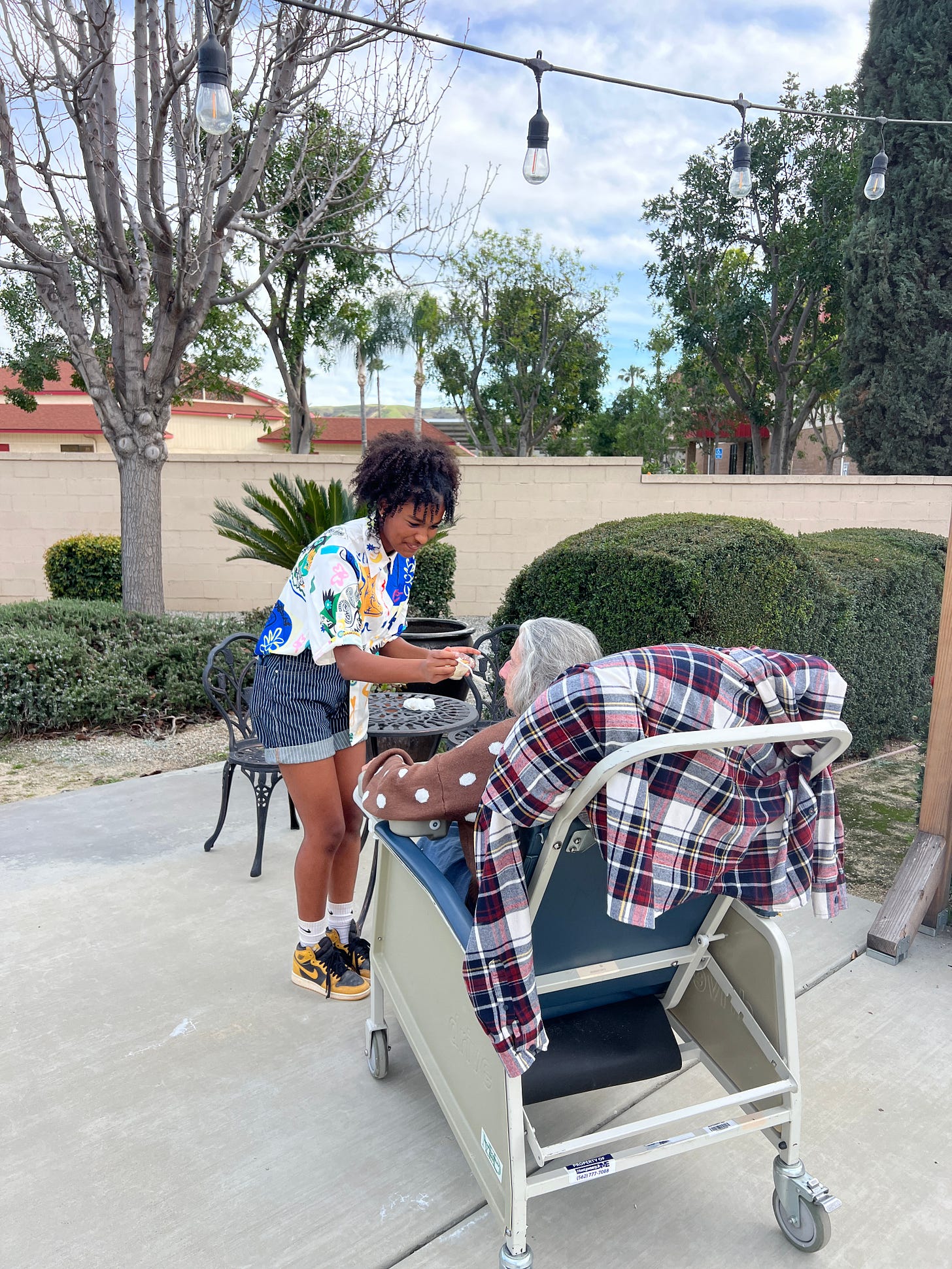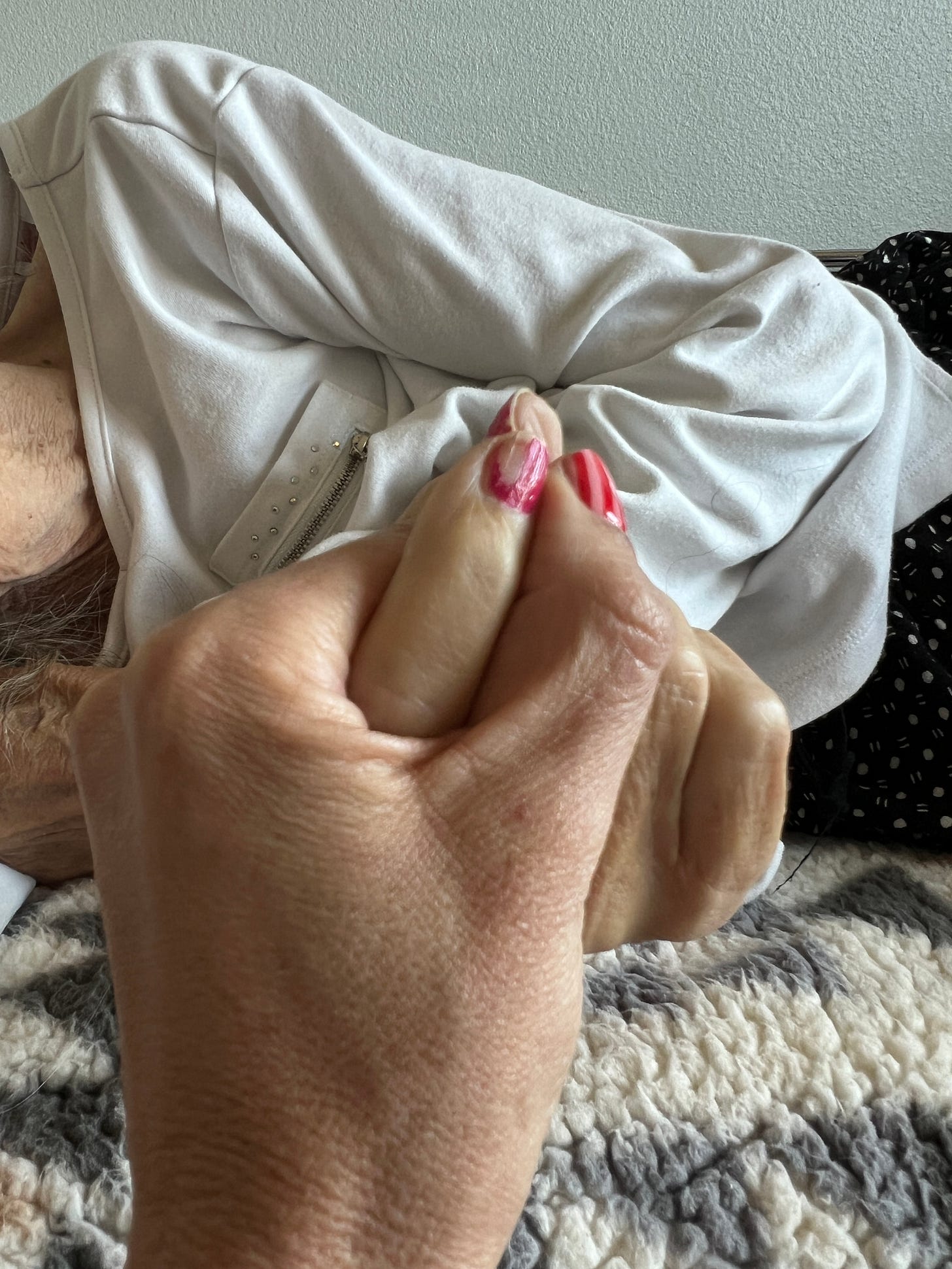"She’s changed a lot since the last time you saw her." I sat in the car, my daughter in the passenger seat, as we drove to visit my mom—her grandma, her “Honey-gram”—who had been placed in a memory care facility a few weeks prior due to Parkinson’s and dementia.
“I know,” she replied, her tone carrying the certainty of her 13-year-old omniscience.
“Truly, it’s worse than you can imagine.”
“Mom, I’ve seen her. I know.”
“Yes, but her disease has progressed significantly since then.” I began painting a picture, hoping to prepare her for what she was about to witness. “To keep her safe, Honey-gram is in a large blue chair with a tray called a gurney chair. It restrains her, and she hates it. Sometimes she bangs her hands loudly on the tray and screams. It can be alarming.”
“That’s okay,” she said simply.
“She’s also very angry and agitated most of the time. She might yell at you, cuss at you, even call you names.”
At this, my daughter giggled. She had never heard her Honey-gram cuss. “Mom, I’m in middle school. I hear cussing all day.”
“I know, but this is different. What you’re about to see is that your Honey-gram isn’t herself anymore—not even a little. I’m deeply upset by what I witness every day when I visit. You’ll likely feel upset too. It’s okay to feel that way. If you want to leave at any time, that’s totally okay. Okay?”
“Okay, Mom. I got it.”
“One more thing,” I said as we pulled into the parking lot. “This facility is for people with Alzheimer’s and dementia. The way they interact with the world is different, and it can be uncomfortable at first. But they are fully human, and they are wonderful.” I squeezed her hand.
“Mom! I got it!”
And you know what? She did.
When the locked door leading into the central hub of The Blooming Place* opened for us, my daughter and I stepped into a world within our world.
Lining the halls were seniors—some in recliners, some in wheelchairs, some wandering. The space was alive with constant commotion as residents had their needs met, visited with each other, or spoke to themselves. Each had a life before, a life they had since lost. Like my mom, they were no longer who they had been months or years ago, prior to living at The Blooming Place, yet somehow still themselves. They were all here because their minds had deceived them.
At first, it was heartbreaking. But over the weeks I’d spent at The Blooming Place, I had learned to see beyond that first impression. Beneath the sadness, there were pockets of goodness—tender moments tucked in corners, quiet kindness humming beneath the loss. Yes, grief filled the space, but so did love. Love between caregivers and residents, love among the residents themselves, and, sometimes, the unwavering love of a visitor who came to sit beside someone they had lost, yet who was still here.
Scanning the room for my mom, I smiled at the residents I had come to know. I gave hugs, introduced them to my daughter, who, to my delight, smiled genuinely at each stranger approaching her, shaking her hand or offering a hug.
“Where’s Honey-gram?” she asked.
Just as she spoke, a loud banging and yelling echoed down the hall.
“Found her.” I put my arm around my daughter, and we walked toward the commotion.
Since arriving at The Blooming Place, my mom had been a person trapped within herself, tormented. She knew who we were, knew when we were there, but her suffering was so constant that none of it seemed to matter. It was horrible and heartbreaking.
“Hi, Mom.” I took her hand. “I love you today.”
As expected, she screamed, cussed, and pulled her hand away.
“Hey, Mom, Truly’s here today.”
“Hi, Honey-gram.” Truly smiled.
My mom didn’t smile, but she reached out her hand. As Truly took it, I stood on high alert, aware of the bruises and scratches on my own arms and hands from past visits.
I spoke gently. “Mom, isn’t it great to see your Truly Star?”
She turned to me with narrowed eyes and threw my hand down. “You, go away!” But then, looking back at Truly, still holding her hand, she softened. “Truly, please stay.”
Truly leaned down for a hug. “I’m not going anywhere, Honey-gram.”
We stayed for an hour that day. There were the same hard moments we had come to expect. But there were sweet moments, too. I watched in awe as my daughter fed my mom banana pudding, wiping the corners of her mouth with a napkin. As she tucked my mom’s hair behind her ears to keep it out of her face.
My mom still yelled. She still cussed. She still squeezed Truly’s hand too hard, and I had to intervene. But Truly took it all with grace, letting her love guide her through the discomfort.
As my mom’s disease has progressed, my husband and I have had countless conversations about whether we should keep visiting—whether we should bring the kids, whether exposing them to this was right. We revisit this question daily.
And yet, this is what I keep coming back to:
To be human is to be vulnerable. The comfort and safeguards we build around ourselves can disappear in an instant or erode over time. But what never changes is Love.
Love is what brings me back to my mom, day after day. It’s what allows me to sit beside her and say, “I see you. I am with you. I am for you. I love you.” It’s what ensures that though she is gone in so many ways, she will not be cast aside or forgotten.
There is a great mystery in this—this total resolve, this acceptance of who she now is. The deep ache of missing her, even as she sits right in front of me. And yet, it is a privilege to be here, to bear witness. Being rooted in the disability space has given our family the capacity to hold this terrible, beautiful truth. More than 16 years ago, when I adopted my oldest daughter—who has Down syndrome and had significant health needs—I had to ask myself a fundamental question:
What gives a human life value?
I searched my soul for the answer. And here is where I landed:
The breath in our lungs. The beating of our hearts. The ability to give and receive love.
Our value is innate. We cannot earn it. It does not change as we change. It exists because we exist.
I visit my mom, and I take my kids, because she exists.
I want them to know we don’t turn away from the hard things. That life isn’t meant to be smoothed out for our comfort. The cracks and crevices—the sharp, uncomfortable edges—give us traction when we need it most.
At the same time, I want them to know we don’t have to expose ourselves to the violence and hate being tossed around by this horrible disease which has taken over my mom’s mind. I don’t want them to be traumatized.
We are walking a very fine line here. It’s hard to know what to do. So, we do what we know how to do:
We show up.
We show up knowing that sometimes, the brave thing is to stay. Sometimes, the brave thing is to leave.
But always, the brave thing is to love.




Thank you. This is the best most heartfelt thing I have read and I’m in tears. I know this pain and I share in it with you in similar ways, and different. Praying for your mom, you and the entire family. Love to you Friend!
Nina
This is gut-wrenching and beautiful at the same.
I teared up as I read your words.